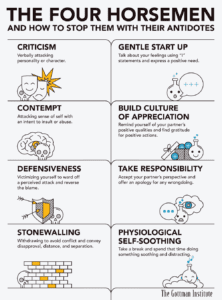Unresolved conflicts in marriage are not like car crashes. Obviously, right? What I mean is that in a car crash there is one moment when you contact another car or object. One minute you are driving, with no thoughts or feelings that come from being in a wreck, and, the next, you are making abrupt contact with something else. After it happens, you know that something needs to happen to take care of yourself and your vehicle. Unfortunately, with unresolved conflicts, the damage isn’t always as obvious as a broken car. Since the damage isn’t always clear, it takes a while to get around to the healing process and, like a broken car becomes more difficult drive around, conflict becomes more difficult to deal with. One of the reasons conflict becomes difficult to manage is that compassion and empathy lessen and anger or frustration starts to become more pervasive.
What is Anger?
Anger is useful but can become a burden to your marriage especially if it escalates to rage. Experts have labeled anger as a secondary emotion meaning that it’s defensive, and it serves to protect you from feeling more difficult and vulnerable feelings. If you have been hurt repeatedly, then you might resort to anger which avoids the pain of feelings like insecurity, shame, guilt, powerlessness, helplessness, or sadness. The more that avoidance happens, the more anger begins to surface.
Anger is useful though. Despite its reputation, it is an emotion that serves to signal we have a need that hasn’t been met. Feelings beneath the anger, like insecurity and shame, come from places of hurt. They signal that we need meaningful connection and support. However, the more we don’t receive that support, the more defensive we become. We continue to put our walls up using anger to protect ourselves.
Dealing with Anger During Conflict
Anger can be difficult to deal with in a marriage. It is hard for your partner to empathize and connect with you when your walls are up. Even if they could, what’s to say that they would want to connect with you when you say hurtful things or yell at them? It’s easy for your partner to respond by putting their walls up as well. Over time, resentment builds as conflicts become plentiful and continue to go unresolved. As unresolved conflicts and anger begin to pile up, you get left with a relationship mildly irritating at its best to completely intolerable at its worst. Even if you are in a relationship that is hardly bearable, I will say that there is hope! Learning to de-escalate, process conflict well, and create emotional intimacy are three things that can help control your anger within the marriage, repair relationship wounds, and maintain a healthy marriage.
De-Escalating the Situation
De-escalating is incredibly important when engaging in conflict with your spouse. When you get angry, your body’s fight or flight system, a.k.a. the sympathetic nervous system gets activated. You have an increased heart rate, rapid breathing, and a spike in energy hormones. Your brain begins to act differently as well. The center of the brain, largely responsible for emotions such as fear and anger, immediately begins to light up. When the center of your brain lights up during a state of arousal, such as anger, there is decreased activity in the frontal lobe of your brain which is responsible for decision making and planning. One of the reasons conflict tends to go unresolved in these states of arousal is that we lose the ability to think clearly. It becomes much easier to blow things out of proportion and place blame on others, including your spouse.
The first step to begin the de-escalation process is to remove yourself from the situation. This means to go into another room in the house or take a walk around the block. If you have been through this before, then you know that you won’t resolve the conflict when you are really frustrated. In fact, it becomes easy to make things worse as you become angrier. Removing yourself from the situation helps to prevent more damage and begin to gain control over your anger. Once you have calmed down you can return to your spouse and resolve the conflict without anger controlling your words.
Avoiding Conflict Resolution Pitfalls
When you finally get back to your spouse, after you have calmed down, you are now ready to engage in conflict resolution.
Dr. John and Julie Gottman are marriage experts with over 40 years of experience in studying and helping couples. They claim that they can predict the end of a relationship by observing four things that happen during the conflict: Criticism, Contempt, Defensiveness, and Stonewalling:
- Criticism – Criticism is easy to spot when you hear words like “always” or “never” during a conflict. A couple of examples of criticism would be “You always forget to take the trash out. You never take responsibility for anything around the house.”
- Defensiveness – Defensiveness is the tendency to avoid blame for any part in a conflict. An example of defensiveness would be “I was too busy to get to that today, why didn’t you just do it?”
- Contempt – Contempt is an attack on your partner’s sense of self. Each horseman is damaging to your partner, but contempt can be one of the most painful forms of bad conflict processing. An example of contempt during conflict is “You are a worthless person. I can’t believe I’m married to you.”
- Stonewalling – Stonewalling is the easiest to spot because it involves few words if any. When your partner is stonewalling they stop speaking and sometimes leave the room to avoid conflict. This signals that they have become hopeless about resolving conflict or feel too overwhelmed to handle conflict. The more that stonewalling surfaces in a relationship, the more dangerous it damages the marriage.

Avoiding the “Four Horseman”, and instead using their productive counterparts, helps to navigate conflict well and work towards a healthier marriage.
Creating Emotional Intimacy
De-escalation and handling conflict well are very important, but emotional intimacy is equally, if not more, important. It is impossible to have a great marriage without emotional intimacy. So, what is it?
Emotional intimacy can be described as the feelings of love, trust, acceptance, and respect created by the willingness of each person to share personal and vulnerable thoughts and feelings.Click To TweetThe more open and transparent each person is while maintaining a non-judgmental and accepting posture with one another, the more emotional intimacy is created. The more that emotional intimacy is created within a marriage, the more you grow a satisfying and fulfilling relationship with your spouse.
I won’t pretend that creating emotional intimacy is easy to do because it isn’t. It takes time and hard work. Set up a date night, take a vacation, or set some time aside while you are at home. Regardless of where you do it, commit to it. Use that time to talk about how each of you is feeling. Maybe how you are feeling about work, the kids, hobbies, or parents, but, most importantly, share how you are feeling about one another. The feelings won’t always be positive or enjoyable, but they are important regardless.
No matter how long you have been married, you don’t know everything about your spouse. They have a different way of thinking and feeling than you do. It is your job to invest time to explore those thoughts and feelings. By doing this, you show your spouse that you care for them and are interested in what’s going on in their life. Essentially, you’re saying and showing “you matter to me” and that is transformative for your spouse and your marriage. We know this because we are transformed by the incredible love God showed us in sacrificing his own Son. That is the ultimate act of God conveying to us that we matter.
These are great things that you can do in response to anger and conflict in your marriage. They can help get you moving in the right direction. Although this process is great, the Holy Spirit can do miracles in and outside of this. This is not meant to be a full-proof plan to repair your marriage, but instead a supplement along with community, prayer, and worship of God. As you draw closer to Him, you will inevitably draw closer to others because “We love because he first loved us” (1 John 4:19).
Mark Shoemaker is a Licensed Professional Counselor Intern in the Dallas area who specializes in anger, anxiety, depression, and couples issues. He has a passion for helping Christian men and women understand how faith plays an integral role in their mental health.
Copyright (c) 2018 Mark Shoemaker, used with permission.











